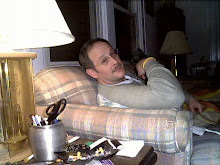Advent is upon us, that period of anticipation heralding the arrival of that great feast of the Church, Christmas. Advent is one of the two periods of anticipation during the Catholic liturgical year during which the faithful are called to reflection and repentance; the other season, more well known, and perhaps more widely observed, Lent, the preparation for the celebration of Easter. In this post, I wish to discuss one aspect of that call of the Church, that is, reflection. Specifically, I wish to address one of the primary things required to affect that reflection, namely silence.
At my core, I think, deep down under my gregarious veneer, there dwells a monk. It wouldn't surprise me to find this bit of monk buried deep down in all people. It is a symptom of the deep yearning to respond to the tireless call of God to join with Him in that mysterious encounter known as prayer. St Augustine realized this when he made his famous prayer, "Our souls are restless until they rest in Thee, O Lord!" And this is as it should be, not in the sense that we are all called to the cloister, but in the sense that we are all called to spend time in silence; the physical and interior silence which houses the presence of God.
But, and I believe that this is no mere coincidence, our culture discourages, even disdains, silence. The noise that pervades modern life is certainly distracting, sometimes deafening, ultimately blinding. Modern life bombards us with aural and visual stimulation most of it noise, that is, sensory stimulation of no value. Some of this noise has a neutral message, but most, in fact, carries messages of a negative nature and due to its omnipresence we cannot help but absorb some of it.
We are made to feel by our friends , coworkers and relatives, that if we are unable to discuss the intricacies of every play of the football game, that if we are unenlightened as to the hi jinks of the featured dysfunctional celebrity of the week, that if we have failed to download the latest pop hit onto our iPod, that we are somehow not in touch with that which really matters. We are bewildered and benumbed by the minutiae with which we are required to absorb simply to be considered to be in touch with the world.
I am not advocating an extreme position which requires the abandonment of any form of entertainment. What I am advocating is "time out". I'm advocating moderation. What is it about silence that frightens the world? Why does modern culture fear that we should spend some moments of quiet reflection? Could it be that those who would have us heed other sources, other foundations for society realize that in those moments of stillness we could hear the voice of God?
I think that that is exactly the case. The world realizes, as did Elijah, that God is not in the mighty wind, that He is not in the power of the earthquake, but that He is in that small quiet voice that stirs within us, and that, given half a chance to hear that Voice we may just heed its message.
Take some time, then this Advent, to be still. Spend some time in quiet anticipation of the arrival of the Messiah (no, not the President-elect). Turn off the TV set, turn down the car radio, pull the ear buds out of your ear and listen to the small, quiet, insistent voice that you'll hear. The message it speaks is that of great hope. You'll be glad you did it.
Til next time, all the best. Joe
My new blog: The Radical Life
11 years ago
